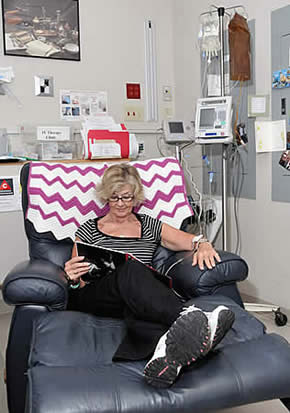When you lose blood from an operation, you lose iron. Iron, by building red blood cells can help your body deal with the stress of losing blood during an operation and speed recovery.
An Iron Healthy Diet
What do I need to eat to get enough iron?
It is important to get enough iron from several different food sources. Iron comes in 2 forms:
- Heme iron is very easily absorbed by the body.
Foods with heme iron are: (from highest to lowest iron content)
- Liver, seafood (clams, muscles, shrimp)
- Beef, lamb, pork
- Turkey, chicken (dark meat has more iron)
- Fish
Non-heme iron is not as well absorbed as heme iron.
Foods with non-heme iron are: (from highest to lowest iron content)
- Black strap molasses
- Lentils, dried beans and peas
- Iron fortified breakfast cereals (cream of wheat, oatmeal, bran flakes)
- Enriched whole grain breads and pasta
- Seeds, nuts and dried fruits (pumpkin, sesame, peanuts, prunes, raisins, apricots)
- Vegetables, especially dark green (baked potatoes with skin on, beets, spinach, broccoli, peas)
- Fruits, sour cherries, watermelon
- Eggs
Where can I find more information about foods high in iron?
To find more foods that are good sources of iron, visit the website:
http://bchealthguide.org/healthfiles/hfile68d.stmWhat can I do to get the iron from my food?
- Eat heme iron foods. Heme iron is easier to absorb than non-heme iron. Eating heme iron helps your body to absorb non-heme iron from other foods.
- Eat foods high in Vitamin C with your meals. Foods that contain vitamin C help your body use non-heme iron.
- Do not have tea or coffee with your meals. Tea and coffee contain polyphenols. Polyphenols decrease the amount of non-heme iron your body can absorb.
- Do not have calcium (pills or foods like milk and dairy products) for 1 hour before or 2 hours after iron foods or pills. Calcium can decrease iron absorption when taken at the same time as iron.
Iron Supplements
Iron supplements should only be taken on the advice of a health care professional (too much iron taken on a long term basis might be harmful).
Which iron supplement should I take?
Many types of iron supplements are available. The patient blood management team will recommend iron supplements that are best for each individual patient.
Will iron interact with my other medications?Tell the patient blood management team about all your prescription medications, over-the-counter medications, and/or herbal medications you are taking.
Generally iron does not interact with other medications, however it is important to tell the patient blood management team if you take thyroid or calcium medication.
How do I take the iron?
Iron is best taken with a full glass of water on an empty stomach, at bedtime is recommended or 1 hour before or 2 hours after meals.
Iron might lead to an upset stomach. If so, take it with food (soda cracker).
What are the side effects of iron pills?Minor side effects are common, especially in the first few days as your body adjusts to the iron. If the side effects continue, talk to the patient blood management team about the iron you are taking.
The minor side effects could include: stomach cramps, heartburn, nausea, vomiting, constipation or diarrhea. Iron pills will cause your stools to turn black. This is due to unabsorbed iron and is not harmful.
How long should I take the iron?The patient blood management team will recommend the time frame for taking iron supplements that is best for each individual patient.
The iron supplement has been suggested because your are having an operation, usually it is taken for a short time before and after your operation to build your body’s iron stores.
A healthy diet, with lots of iron foods will also help to build iron stores.
Intravenous (IV) Iron
What is intravenous (IV) iron?
IV iron is a treatment of a man-made iron medication given to patients through an intravenous line. This treatment involves slowly infusing iron into a vein over 2 to 3 hours. It can be given at London Health Sciences Centre (LHSC) in the IV Therapy Clinic.
Which patients are given IV Iron?
The patient blood management team may suggest IV iron for patients with a very low ferritin (blood test of iron stores) level.IV iron might be suggested if a patient with low hemoglobin and low ferritin cannot take iron pills.
If the number of days before your operation is short (less than 14 days) and your hemoglobin is low, IV iron might be suggested.
What are the benefits of IV iron?
Iron is one of the important ingredients the body needs to make hemoglobin. If a patient goes into an operation with low hemoglobin, it can quickly become seriously low. The patient blood management team works to have your hemoglobin the best it can be before your operation.
IV iron can give your body a lot of iron very quickly. One treatment is the same as taking iron pills for about 2-3 months.
IV iron is given right into your vein. This method avoids the step of iron being absorbed from the stomach.
What does the doctor need to know about me?
It is important for the patient blood management team to know your medical history, allergies and medications that you take.
It is very important to tell us if you have had IV iron in the past.
If you have had IV iron in the past, please tell us about any side effects that you noticed.If you are treated with IV iron, your family doctor will be given information.
What are the side effects of intravenous iron?
Allergic reactions are possible but do not happen often. Tell the nurse giving you the IV iron treatment if you have:
trouble breathing, chest tightness, swelling of your throat, face, mouth or tongue, hives, itching, feeling warm or lightheaded.If you have any of these symptoms, the nurses in LHSC’s IV Therapy Clinic will have the patient blood management doctor on-call check on you. There is medication to help ease these side effects.
Less serious side effects that can happen up to 48 hours after IV iron are: joint and muscle pain, moderate to high fever, backache, chills, dizziness, headache, feeling like you have the flu, stomach cramps or pains, nausea or vomiting, itching or a rash.
If you have any symptoms while at LHSC, tell the nurses. There is medication to help ease these side effects.
If you have any symptoms after leaving the hospital, visit your family doctor, a walk-in clinic or the closest emergency department.
The patient blood management team should be notified of any side effects.How/where is IV iron given?
A doctor must be on-call in the hospital when IV iron is given. Some types of iron medication are given as a small test dose first and then the rest of the treatment. For some types of iron medication, you must stay at the hospital for 30-60 minutes after the treatment.
At LHSC, IV iron is given in the IV Therapy Clinic, located at University Hospital and at Victoria Hospital.
How many treatments will I need?
For most patients, only one IV iron treatment is needed before an operation. The patient blood management team will recommend treatment to have your hemoglobin the best it can be before your operation.
Will IV iron interact with my other medications?
Tell the patient blood management team about all your prescription medications, over-the-counter medications, and/or herbal medications you are taking.
In general, IV iron will not interact with other medications.
If I take iron pills, can I still have IV iron?
There is no harm in taking iron pills and having IV iron treatment.
IV iron treatment is recommended by the patient blood management team to help have your hemoglobin the best it can be before your operation.
Usually, the IV iron treatment is not enough iron to completely fix a low iron level. The patient blood management team will recommend iron supplements that are best for each individual patient.




